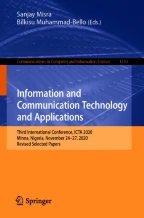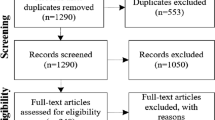Mobile Application Software Usability Evaluation: Issues, Methods and Future Research Directions

Recently, the growth and advancement in mobile technology (such as mobile devices, smartphones, mobile wireless networks) have cushioned everyday lives of peoples across the globe. Interestingly, this can be attributed to the greater ease of developing mobile applications for diverse usages such as healthcare, finance, and agriculture. Another reason for this is that, there is the quest to rollout mobile device tailored application software having lower budget, quicker time of delivery, and top-quality product from the developers and the end-user’s perspectives. The challenges of appropriate designs frameworks; and the understanding of the needs of users (that is, the end users) have persisted long after their eventual rollouts. The concept of mobile app usability and accessibility evaluation were developed to enable developers to ascertain the level of usages and relevance of mobile applications in-use or prior release under diverse criteria such as maintainability, understandability, comprehensibility, as well as parameters specified by Usability Standards of ISO 9241-11 (that is, effectiveness, efficiency, and satisfaction). This study undertakes a systematic literature review (SLR) to discuss the subject of mobile application software usability under the specific scope of issues, methods and future research directions. To achieve these, a total of forty (40) peer-reviewed articles from diverse databases/sources of records were selected. The outcomes of this study revealed that, mobile applications usability evaluations and processes are domain-specific (or locality-dependent). Also, there are no generic approaches identified or developed for performing usability and accessibility of mobile applications due to the non-deterministic nature of the domain, and context-of-use.
This is a preview of subscription content, log in via an institution to check access.
Access this chapter
Subscribe and save
Springer+ Basic
€32.70 /Month
- Get 10 units per month
- Download Article/Chapter or eBook
- 1 Unit = 1 Article or 1 Chapter
- Cancel anytime
Buy Now
Price includes VAT (France)
eBook EUR 85.59 Price includes VAT (France)
Softcover Book EUR 105.49 Price includes VAT (France)
Tax calculation will be finalised at checkout
Purchases are for personal use only
Similar content being viewed by others

Mobile Applications Usability Evaluation: Systematic Review and Reappraisal
Chapter © 2022

A systematic literature review of mobile application usability: addressing the design perspective
Article 02 August 2022

Mobile Usability: Review, Classifications and Future Directions
Chapter © 2020
References
- Weichbroth, P.: Usability of mobile applications: a systematic literature study. IEEE Access 8, 55563–55577 (2020) ArticleGoogle Scholar
- Swaid, S.I., Suid, T.Z.: Usability of mobile apps: an integrated approach usability heuristics for M-commerce apps. In: International Conference on Applied Human Factors and Ergonomics, pp. 79–88 (2018) Google Scholar
- Sereda, M., Smith, S., Newton, K., Stockdale, D.: Mobile apps for management of tinnitus: users’ survey, quality assessment, and content analysis. JMIR mHeakth uHealth 7(1), e10353 (2019) ArticleGoogle Scholar
- Gupta, D., Ahlawat, A.K., Sagar, K.: Usability prediction & ranking of SDLC models using fuzzy hierarchical usability model. Open Eng. 7(1), 161–168 (2017) ArticleGoogle Scholar
- Evans, S.H., Clarke, P., Glovinsky, J.: A consumer health app works well. but, diffusion is not so easy. J. Technol. Behav. Sci. 5(2), 164–170 (2019) Google Scholar
- Dur, M.A.: Usability heuristics for mobile applications a systematic review. In: ICEIS, pp. 978–989 (2018) Google Scholar
- Hoehle, H., Venkatesh, V.: Mobile application usability: conceptualization and instrument development. MIS Q. 39(2), 435–472 (2015) ArticleGoogle Scholar
- Hussain, A., Mkpojiogu, E.O.C., Jamaludin, N.H., Moh, S.T.L.: A usability evaluation of Lazada mobile application. In: AIP Conference Proceedings, vol. 1891, no. 1, pp. 020059 (2017) Google Scholar
- Weichbroth, P.: A mixed-methods measurement and evaluation methodology for mobile application usability studies. Architecture 43(44), 45 (2019) Google Scholar
- ISO, W. 9241–11.: Ergonomic requirements for office work with visual display terminals (VDTs). The international organization for standardization, vol. 45 (1998) Google Scholar
- Joyce, G., Lilley, M., Barker, T., Jefferies, A.: Mobile application usability heuristics: decoupling context-of-use. In: Marcus, A., Wang, W. (eds.) DUXU 2017. LNCS, vol. 10288, pp. 410–423. Springer, Cham (2017). https://doi.org/10.1007/978-3-319-58634-2_30ChapterGoogle Scholar
- Islam, M.N., Bouwman, H., Islam, A.K.M.N.: Evaluating web and mobile user interfaces with semiotics: an empirical study. IEEE Access 8, 84396–84414 (2020) ArticleGoogle Scholar
- Sagar, K., Saha, A.: Qualitative usability feature selection with ranking: a novel approach for ranking the identified usability problematic attributes for academic websites using data-mining techniques. Hum. Centric Comput. Inf. Sci. 7(1), 29 (2017) ArticleGoogle Scholar
- Bessghaier, N., Soui, M.: Towards usability evaluation of hybrid mobile user interfaces. In: 2017 IEEE/ACS 14th International Conference on Computer Systems and Applications, pp. 895–900 (2017) Google Scholar
- Weichbroth, P.: Delivering usability in IT products: empirical lessons from the field. Int. J. Softw. Eng. Knowl. Eng. 28(07), 1027–1045 (2018) ArticleGoogle Scholar
- Msweli, N.T., Mawela, T.: Enablers and barriers for mobile commerce and banking services among the elderly in developing countries: a systematic review. In: Conference on e-Business, e-Services and e-Society, pp. 319–330 (2020) Google Scholar
- Tavakoli, M., Zhao, L., Heydari, A., Nenadi, G.: Extracting useful software development information from mobile application reviews: a survey of intelligent mining techniques and tools. Expert Syst. Appl. 113, 186–199 (2018) ArticleGoogle Scholar
- ISO.: ISO/IEC 9126-1:2001 Software engineering – Product quality- Part 1: Quality model. ISO/IEC JTC 1/ SC 7 Software and systems engineering, vol. 25 (2001) Google Scholar
- ISO.: ISO/DIS 9241-171:2008 Ergonomics of Human-System Interaction – Part 171: Guidance on software Accessibility. Technical report, International Organization for Standardization (2008) Google Scholar
- Radatz, J., Geraci, A., Katki, F.: IEEE standard glossary of software engineering terminology. IEEE Std. 610.12-1990. Computer Society of the IEEE (1990) Google Scholar
- European Union.: Directive (EU) 2016/2102 of the European Parliament and of the Council of 26 October 2016 on the accessibility of the websites and mobile applications of public sector bodies (2016) Google Scholar
- Nathan, S.S., Hussain, A., Hashim, N.L.: Usability evaluation of DEAF mobile application interface: a systematic review. J. Eng. Appl. Sci. 13(2), 291–297 (2018) Google Scholar
- Arnhold, M., Quade, M., Kirch, W., Arnhold, M.: Mobile applications for diabetics: a systematic review and expert-based usability evaluation considering the special requirements of diabetes patients age 50 years or older. J. Med. Internet Res. 16(4), e104 (2014) ArticleGoogle Scholar
- Shah, U.M., Chiew, T.K.: A systematic literature review of the design approach and usability evaluation of the pain management mobile applications. Symmetry 11(3), 400 (2019) ArticleGoogle Scholar
- Medina, J.L.P., Acosta-Vargas, P., Rybarczyk, Y.: A systematic literature review of usability and accessibility in tele-rehabilitation systems. In: Assistive and Rehabilitation Engineering. IntechOpen, pp. 1–20 (2019) Google Scholar
- Harrison, R., Flood, D., Duce, D.: A systematic literature review of usability and accessibility in tele-rehabilitation systems. J. Interact. Sci. 1, 1–16 (2013) ArticleGoogle Scholar
- Shitkova, M., Holler, J., Heide, T., Clever, N., Becker, J.: Towards usability guidelines for mobile websites and applications. In: Proceedings of 2015 Wirtschaftsinformatik, vol. 107, pp. 1603–1617 (2015) Google Scholar
- Kaur, A., Kaur, K.: Systematic literature review of mobile application development and testing effort estimation. J. King Saud Univ. Comput. Inf. Sci. (2018). https://doi.org/10.1016/j.jksuci.2018.11.002ArticleGoogle Scholar
- Weichbroth, P., Baj-rogowska, A.: Do online reviews reveal mobile application usability and user experience? The case of WhatsApp. In: Proceedings of the Federated Conference on Computer Science and Information Systems, vol. 18, pp. 747–754 (2019) Google Scholar
- Jha, S., et al.: Deep learning approach for software maintainability metrics prediction. IEEE Access 7, 61840–61855 (2019) ArticleGoogle Scholar
- Da Costa, R.P., Canedo, E.D., De Sousa, R.T., Albuquerque, R.D.O., Villalba, L.J.G.: Set of usability heuristics for quality assessment of mobile applications on smartphones. IEEE Access 7, 116145–116161 (2019) ArticleGoogle Scholar
- Genc-nayebi, N., Abran, A.: A systematic literature review: opinion mining studies from mobile app store user reviews. J. Syst. Softw. 125, 207–219 (2016) ArticleGoogle Scholar
- Moher, D., Liberati, A., Tetzla, J., Altman, D.G.: Preferred reporting items for systematic reviews and meta-analyses. Ann. Intern. Med. 151(4), 264–269 (2009) ArticleGoogle Scholar
- Kitchenham, B., Charters, S.: Guidelines for Performing Systematic Literature Reviews in Software Engineering. Software Engineering Group, Keele (2007) Google Scholar
- Kaur, A., Kaur, K.: Suitability of existing software development life cycle (SDLC) in context of mobile application development life cycle (MADLC). Int. J. Comput. Appl. 116(19), 1–6 (2015) Google Scholar
- Khowaja, K., Al-Thani, D., Aqle, A., Banire, B.: Accessibility or usability of the user interfaces for visually impaired users? A comparative study. In: Antona, M., Stephanidis, C. (eds.) HCII 2019. LNCS, vol. 11572, pp. 268–283. Springer, Cham (2019). https://doi.org/10.1007/978-3-030-23560-4_20ChapterGoogle Scholar
- Behnamghader, P., Boehm, B.: Towards better understanding of software maintainability evolution. In: Adams, S., Beling, Peter A., Lambert, James H., Scherer, William T., Fleming, Cody H. (eds.) Systems Engineering in Context, pp. 593–603. Springer, Cham (2019). https://doi.org/10.1007/978-3-030-00114-8_47ChapterGoogle Scholar
- Reddy, B.R., Ojha, A.: Performance of maintainability index prediction models: a feature selection based study. Evol. Syst. 10(2), 179–204 (2019). https://doi.org/10.1007/s12530-017-9201-0ArticleGoogle Scholar
- Liu, X., Ai, W.E.I., Li, H., Tang, J., Huang, G., Feng, F., Mei, Q.: Deriving user preferences of mobile apps from their management activities. ACM Trans. Inf. Syst. 35(4), 1–32 (2017) ArticleGoogle Scholar
- Saleh, A.M., Ismail, R.B.: Usability evaluation frameworks of mobile application: a mini-systematic literature review. In: Global Summit on Education, pp. 1–10 (2015) Google Scholar
- Nur, M., Sulaiman, S., Aman, S.: Heuristic evaluation: comparing generic and specific usability heuristics for identification of usability problems in a living museum mobile guide app. In: Advances in Human-Computer Interaction (2018) Google Scholar
- Feiner, J., et al.: A new approach to visualise accessibility problems of mobile apps in source code. In: Proceedings of the 20th International Conference on Enterprise Information System, vol. 2, pp. 519–526 (2018) Google Scholar
- Adewumi, A.O., Omoregbe, N.A., Misra, S.: Usability evaluation of mobile access to institutional repository. Int. J. Pharm. Tech. 8(4), 22892–22905 (2016) Google Scholar
Author information
Authors and Affiliations
- Federal University of Technology, Minna, Nigeria Blessing Iganya Attah, John Kolo Alhassan, Ishaq Oyebisi Oyefolahan & Sulaimon Adebayo Bashir
- Blessing Iganya Attah


